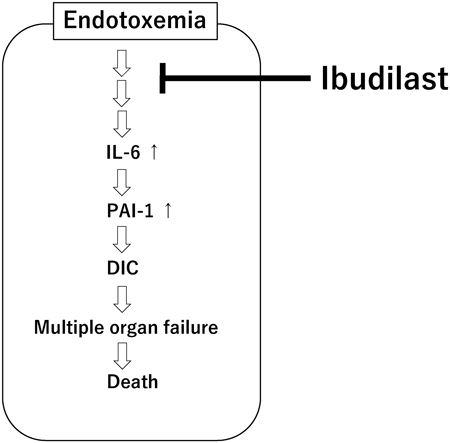3 0 0 0 OA Ibudilast Reduces IL-6 Levels and Ameliorates Symptoms in Lipopolysaccharide-Induced Sepsis Mice
- 著者
- Naoko Kadota Akari Yoshida Atsushi Sawamoto Satoshi Okuyama Mitsunari Nakajima
- 出版者
- The Pharmaceutical Society of Japan
- 雑誌
- Biological and Pharmaceutical Bulletin (ISSN:09186158)
- 巻号頁・発行日
- vol.45, no.8, pp.1180-1184, 2022-08-01 (Released:2022-08-01)
- 参考文献数
- 30
- 被引用文献数
- 1
In Japan, ibudilast (IBD) is a therapeutic agent used to treat asthma, allergic conjunctivitis, and dizziness caused by cerebrovascular disease. Previously, we have reported that IBD could reduce the secretion of proinflammatory cytokines, including interleukin (IL)-6 and tumor necrosis factor (TNF)-α, in lipopolysaccharide (LPS)-treated RAW264.7 monocyte-linage cells in vitro. In the present study, we examined the anti-inflammatory effects of IBD in vivo. As IL-6 is a biomarker for sepsis and has been suggested to exacerbate symptoms, we determined whether IBD reduces IL-6 levels in vivo and improves sepsis symptoms in animal models. We observed that IBD treatment reduced IL-6 levels in the lungs of LPS-treated mice and improved LPS-induced hypothermia, one of the symptoms of sepsis. In addition, IBD reduced IL-6 and attenuated plasminogen activator inhibitor-1 (PAI-1) and alanine aminotransferase (ALT) levels in the serum of LPS-treated mice. Elevated PAI-1 levels exacerbate sepsis-induced disseminated intravascular coagulation (DIC), and ALT is a biomarker for liver dysfunction. IBD improved the survival of mice administered a lethal dose of LPS. IBD administration ameliorated kidney pathology of model mice. Overall, these results suggest that IBD exerts anti-inflammatory functions in vivo and could be a drug candidate for treating endotoxemia, including sepsis.
